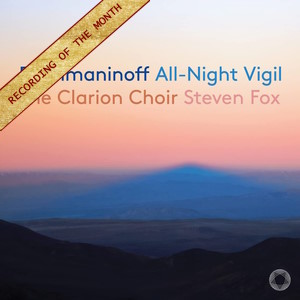
Sergey Rachmaninov (1873-1943)
All-Night Vigil (Vespers), Op. 37 (1915)
Mikki Sodergren (alto); John Ramseyer (tenor); Jonathan Woody (bass)
The Clarion Choir/Steven Fox
rec. 2020, Archdiocesan Cathedral of the Holy Trinity, New York
Russian transliteration of liturgical text and English translation
Pentatone PTC5187019 [75]
In fifty years, no recording of Rachmaninov’s All Night Vigil or Vespers has shaken my loyalty to the vintage account by Sveshnikov on Melodiya I reviewed here. That does not mean that I am not interested in new recordings and the aural snippets online of this latest version from the Clarion Choir were sufficiently intriguing to persuade me to request it for review.
Numbering 32 members, the Clarion Choir might presumably somewhat smaller than the standard Russian cohort, so this is obviously a different, more intimate account, but there is no lack of weight, volume or virtuosity in their delivery and in concerted forte passages such as the climax of “Rejoice, O Virgin” it is hard not to think that they must be more numerous. The soloists are drawn from within their ranks; my ears were pinned back by the opening in a way that no other recording since the Melodiya version has been able to do, first with the resonance of bass Glenn Miller’s “Opening Exclamation” then the sonority of the choir. The sopranos soar angelically, the basses intone hieratically; they might not quite have the almost supernatural profundity of Sveshnikov’s State Academic Russian Choir in 1965 but they come closer than any I have heard since. Intonation, blend and unanimity are ideal; no voice obtrudes immoderately and at no point do we listeners feel as if we are hearing a bunch of Americans masquerading as Russians.
The mezzo-soprano soloist in “Bless the Lord, my soul”, track 2, is a little more restrained and less characterful than Sveshnikov’s but she is steady, musical and warm-toned. The first low C at the end of the track is splendid. There are some lovely touches, such as the way the tempo is accelerated for “Slava Ottsu” (Glory to the Father) towards the end of my favourite track, no. 3, “Blessed is the Man” with its repeatedly intoned “Alliluiya” and the succeeding female chorus “O Gladsome Light” is impeccably homogeneous. Then it is the tenors’ turn before the basses creep in magically and in John Ramseyer we hear the best tenor solo since Sveshnikov’s plangent Konstantin Ognevoi. His solo in “Lord, now lettest” is poised yet passionate and the basses descend confidently to the notorious low B-flat, over two octaves below middle C, and sustain it satisfyingly through to the end of the movement.
I do not speak Russian but love the sound of the language and it seems to me that Steven Fox’s choir pay special care to enunciating the sacred text correctly and meaningfully as part of a liturgy lived in faith rather than a concert performance. This aspect of their singing is especially striking in the unison chanting of the verses of the Magnificat, track 14. While so much of the Vigil is soulful and mysterious, the brief, concluding hymn, “To Thee, O Victorious Leader” is like the joyful pealing of bells and reflects my own reaction to this uplifting enterprise.
The running time is considerably longer than most recordings; the choir takes its time over Rachmaninov’s shifting harmonies.
The recording acoustic of the Greek Orthodox Archdiocesan Cathedral is ideal and the cardboard digipack presentation, with a cover photograph of sunrise in the Chilean desert, is very attractive.
Ralph Moore
Help us financially by purchasing from





















